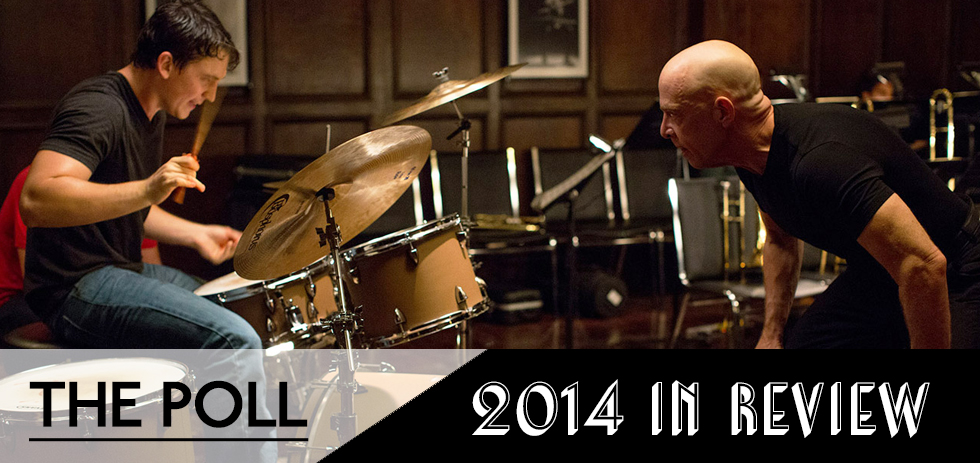For a more clinical look at films in 2014, we asked 11 of our contributors to vote in a poll that covers all the major film awards usually handed out at a Critics Circle in the lead-up to Awards Season each year. The voters are the writers who have seen the most films released theatrically in Australia from December 18, 2013 to December 11, 2014. The reason for this slightly unusual approach to a ‘year’ for voting purposes is because each year when end of year lists and awards are trotted out, inevitably films released in late December each year are totally ignored. As a result, we carry across the final two weeks of theatrical releases from the previous year. This should only have minor impacts on the poll, though any time a film from this window either wins or is listed in one of the individual best of 2014 lists at the bottom of this post, it will be marked with *.
Participating writers: Conor Bateman, Brad Mariano, Jeremy Elphick, Jessica Ellicott, Felix Hubble, Dominic Barlow, Dominic Ellis, Virat Nehru, Saro Lusty-Cavallari, Luke Goodsell and Ian Barr
Poll Instructions
Each writer was asked to submit a list of 10 films, ranked, for the award of Best Theatrical Release. Points were awarded on the basis of position in the list, 10 points for first, 9 for second, and so on.
Each writer was also asked to submit up to three nominations for each of the categories below. These nominations were tallied up and whichever got the most amount of mentions was deemed the winner. In the event of a tie a shortlist was formed and submitted for tiebreaker voting.
Best Film – Boyhood

Runners-Up – 2. The Broken Circle Breakdown and The Immigrant (tie), 4. Winter Sleep, 5. Inside Llewyn Davis, 6. Calvary, 7. Whiplash, 8. Blue Is the Warmest Color, 9. Two Days, One Night, 10. The Wolf of Wall Street
There was a fair amount of division this year from the voting writers, with nine different films being placed first in one or more lists. The result, though, was fairly decisive, Richard Linklater’s Boyhood taking the top prize by a fairly large margin. Further back it was very tight, so much so that even a ‘most mentions’ tiebreaker couldn’t separate Felix van Groeningen’s The Broken Circle Breakdown and James Gray’s The Immigrant, which both gained most of its points from being placed in the top three films from three different writers. It’s also worth noting that only one ballot contained both films. Australian release dates have created the quirk in that we have two different Palme d’Or winners nestled in our top 10 in the one calendar year, also The Broken Circle Breakdown, Inside Llewyn Davis, Blue Is the Warmest Color and The Wolf of Wall Street were all released internationally prior to 2014.
“It’s all about a perspective, with the level of emotional depth and insight that makes it so universally compelling. Not only is the narrative arc a Künstlerroman, the film itself can be read to be one, Linklater’s filmmaking style changing and maturing as the film progresses. Boyhood, then, is a filmic triumph, not just in what it achieves on a structural level but in how it develops a bond with the audience, showcasing something sincere and genuine – a life lived.” – Review by Conor Bateman
Best Actor – Jake Gyllenhaal, Nightcrawler
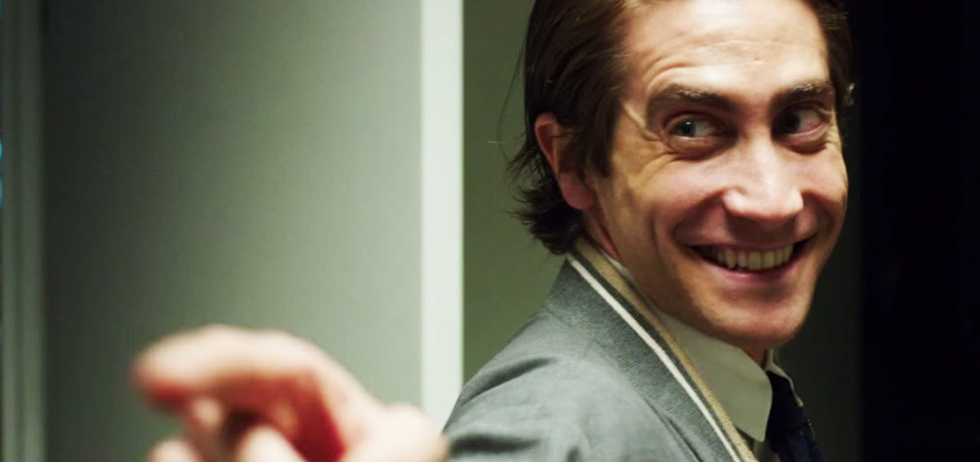
Runner-Up – Joaquin Phoenix, The Immigrant
The Best Actor poll was much less interesting this year than that for Best Actress, which saw a 5-way tie at one point in the tallying. There were a lot of nominations too, the most surprising of which was likely Jesse Eisenberg in Night Moves. The two leaders though saw Phoenix nominated perhaps in relation to the quality of the film as a whole, whereas Gyllenhaal, whose film didn’t even crack our overall top 20, seemed to stand out from his film.
“For a role which ostensibly reacts against character development, Gyllenhaal manages to make Bloom a gripping on-screen persona, delivering a thoroughly unsettling performance relying on almost reflexive masks of expression. Even in the sole moment of violent rage, an impressive scene in which Bloom smashes his bathroom mirror, Gyllenhaal’s gaze is frightening yet intentionally forced, the creation of a mask for purposes of self-deception.” – Review by Conor Bateman
Best Actress – Adèle Exarchopoulos, Blue Is the Warmest Color
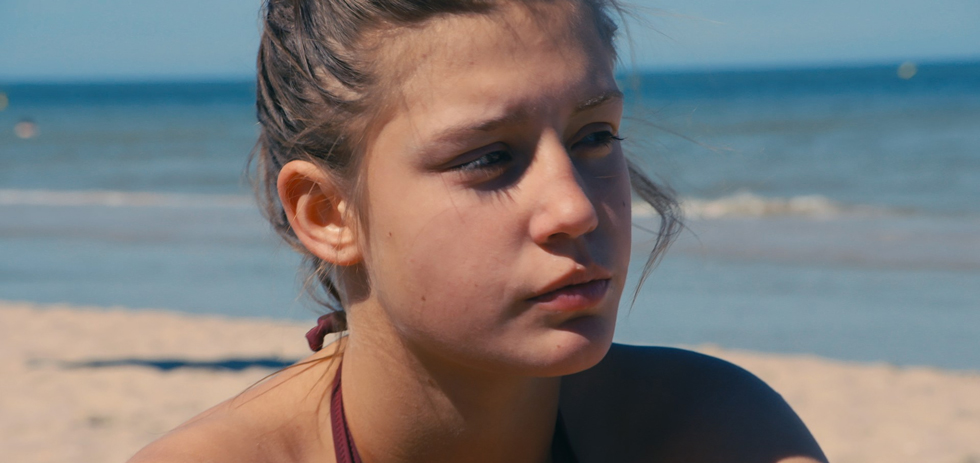
Runner-Up – Rosamund Pike, Gone Girl
The most hotly contested of all of the categories, our Best Actress race came down to two very different performances, Rosamund Pike’s character of two halves in David Fincher’s twisty Gone Girl and Adele Exarchopolous’ heart-rending turn in Blue Is the Warmest Color. Special mention should go to Marion Cotillard in both The Immigrant and Two Days, One Night, which tied for 3rd on their own. She and Scarlett Johansson were nominated for two separate performances this year.
“Adele Exarchopoulos’ performance was astounding…You feel everything she feels, from her isolation during high school, to her love, her sexual pleasure, her discomfort and most strongly her despair and loss at the end of the relationship. Her performance is almost envy-inducing; she acts with such emotional maturity and has an undeniable command of it.” – Review by Jess Alcamo
Best Director – Richard Linklater, Boyhood

Runner-Up – Kelly Reichardt, Night Moves
Much has been written about Boyhood as an award frontrunner and its perhaps an accidental one at that. Linklater has never been a filmmaker to covet awards or recognition in particular, having been devoted to structural and narrative conceits similar to Boyhood his entire career.1 His ability to maintain a consistent tone throughout the prolonged filming period is something to be praised, even as technology changed around him the film doesn’t feel like it’s leaping headlong into each coming year, slowly and organically passing through time.
“At times, Linklater seems to be channelling the aforementioned Benning but also Gus van Sant, the similarities in the darkroom sequences and high school to Elephant are undeniable, and the way he shoots the open road, with a wistful romanticism, calls to mind My Own Private Idaho.” – Review by Conor Bateman
Best Cinematography – Darius Khondji, The Immigrant
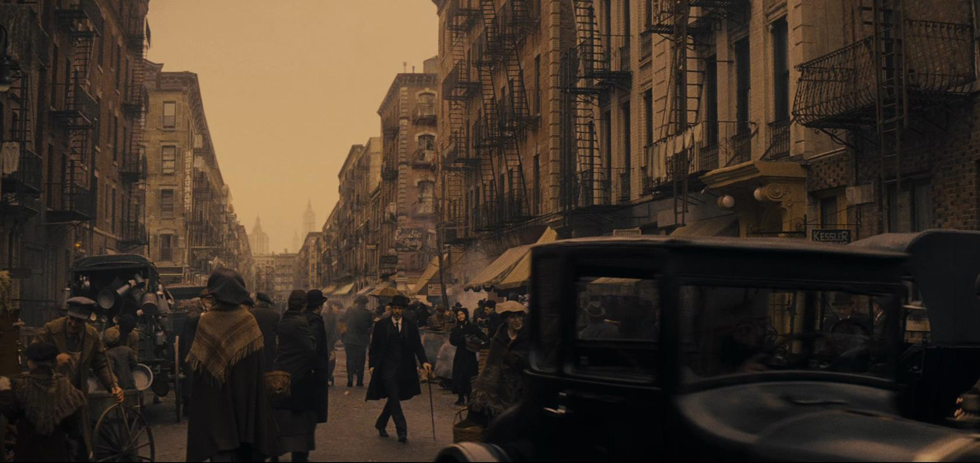
Runner-Up – Yorick Le Saux, Only Lovers Left Alive
Cinematography was one of the closer races in our poll, for a while Ayoade’s The Double gave Khondji a real scare, but ultimately his precisely articulated vision of a New York gone by took the prize.
“The film’s attention to period detail, highlighted by cinematographer Darius Khondji’s glorious sepia-toned photography, is such that we don’t need obvious long diversions or montages of scene-setting to set up the world of the film and its thematic armature…here’s an instant lived-in feel that’s instantly expansive – not coincidentally, it’s the first film ever shot on the actual Ellis Island where immigrants were processed – large establishing shots of ghettoised precincts aren’t thrown at us to force us into the period.” – Review by Brad Mariano
Best Supporting Actor – J.K. Simmons, Whiplash
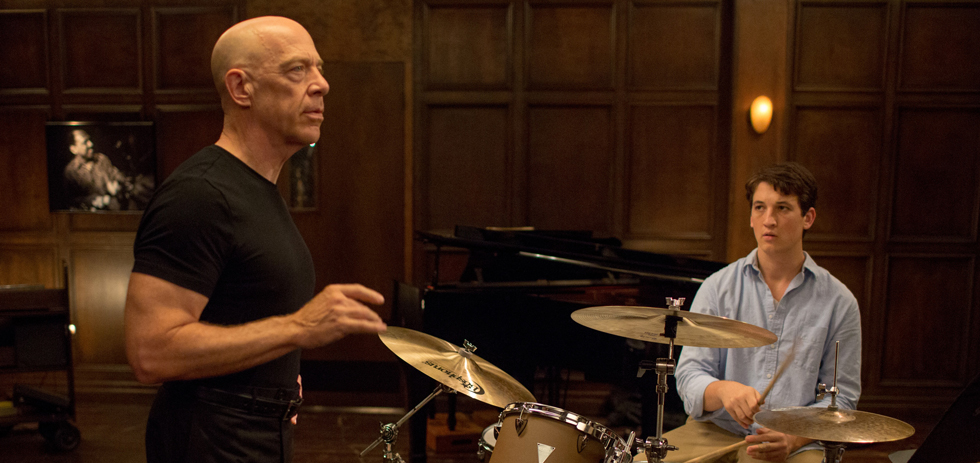
Runner-Up – Ethan Hawke, Boyhood
This was the biggest win by quite a margin, Simmons steamrolling this poll just as he appears to be doing in the lead-up to the Oscars.
“At the very least, like Harry Dean Stanton in Paris, Texas, the film shows what can happen when you really give a seasoned character actor a chance in the spotlight – after a decade of prominence in the Coens universe, Spiderman and treading water in unchallenging roles like The Closer, JK Simmons steals the film as the tyrannical instructor, with a gusto and passion reminiscent of R. Lee Ermey in Full Metal Jacket.” – Brad Mariano
Best Supporting Actress – Patricia Arquette, Boyhood
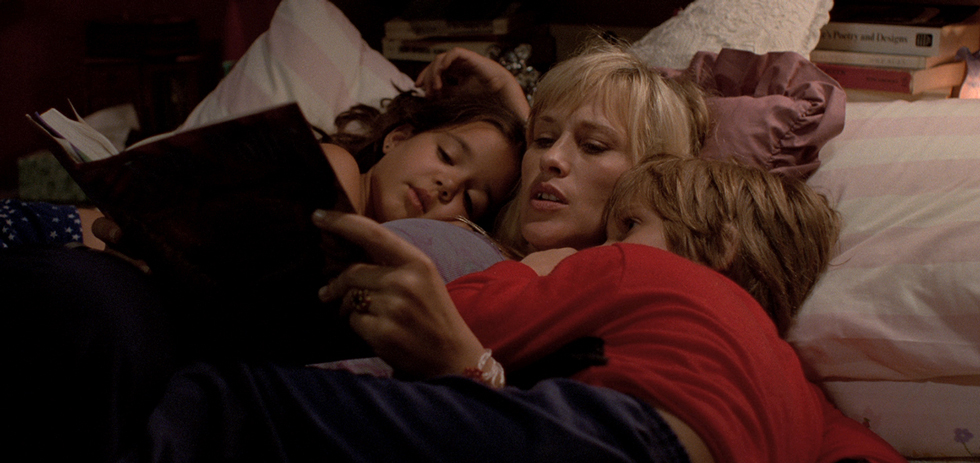
Runner-Up – Léa Seydoux, Blue is the Warmest Color
Just as impressive as Linklater’s ability to direct a film over a 12-year period, Patricia Arquette’s performance evolves over the course of filming, in retrospect the true emotional center of the film. A scene late in the film between her and Mason showcases one of the best scene-specific performances of anyone in anything this year.
“The way in which she is able to guide the younger actors in the early scenes of the film and thereafter develops a real and organic sense of character over time for herself is remarkable. Her final scene, in which she laments the state of her life and the in-built life structure of raising a child, is heartbreaking and perfect.” – Review by Conor Bateman
Best Screenplay – Spike Jonze, Her
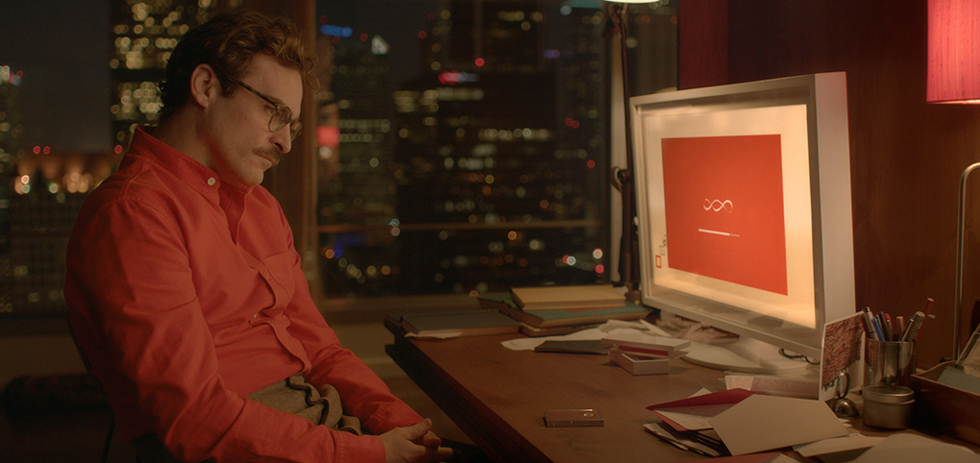
Runners-Up – Carl Joos, Felix Van Groeningen, and Charlotte Vandermeersch, The Broken Circle Breakdown + Richard Linklater, Boyhood + Wes Anderson, The Grand Budapest Hotel (3-way tie)
As the fact that there were three runners-up should attest, screenplay was an intense competition in this poll, with all three films that play with time in some significant manner. The winner, though, which already nabbed Jonze an Oscar, is a daring and unique script.
The true achievement of Jonze’s script is his ability to craft a love story that inherently transcends the physical. In a genre that relies too heavily on superficial attachments for audiences to latch onto, Her’s concept necessitates a love story that is truly about two minds becoming one. While critics chastised Jonze for literally disembodying his lead female, this simple sci-fi twist on the exhausted romantic comedy trope stripped it of the sickly male gaze and let the audience experience the height of a good relationship. In love we can sometimes experience the world through one set of eyes and it took a robot to accomplish that on-screen. – Saro Lusty-Cavallari
Best Editing – Tom Cross, Whiplash
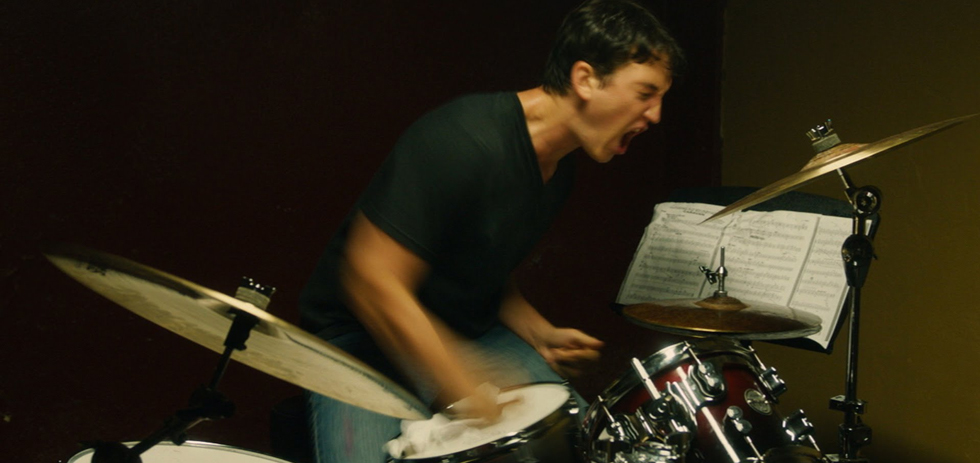
Runners-Up – Thelma Schoonmaker, The Wolf of Wall Street + Kirk Baxter, Gone Girl (tie)
“The fear and brutality that drives the music in the film also accounts for why, stylistically, it remains percussive and energetic, if lacking the warmth and spontaneity one associates with ‘jazzy’ filmmaking. Chazelle fills each scene to the brim with insert shots (a split-second glimpse of saliva falling to the feet of a player from a released spit valve is one of the film’s most indelible, tactile images) that divvy his scenes into an overload of sensual and metabolic detail, even before Andrew starts profusely bleeding from splintered sticks.” – Review by Ian Barr
Best Production Design – Adam Stockhausen, The Grand Budapest Hotel
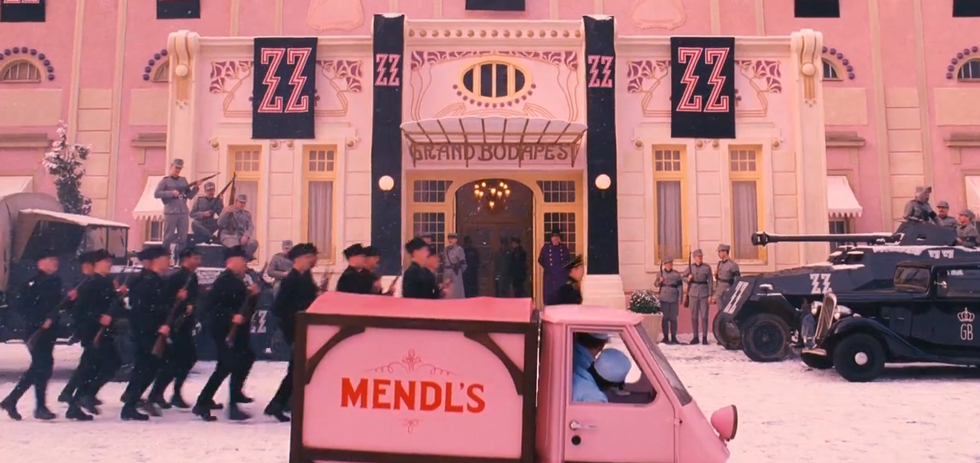
Runner-Up – K. K. Barrett, Her
“In fact, this fastidiousness of style is what charms us. Characters haphazardly skiing down mountain slopes, or shots of hotels revealed in their vast grandeur, are evidently taken on miniature sets and with the limited aid of visual effects. Each frame adheres to a strict colour palette, dominated by fairy-floss pinks and dowager-lipstick reds. These filmic devices are self-reflexive, they draw attention to themselves as markers of the film’s fabricated nature, but because we are consistently presented with a constructed quality throughout, it is easy to marvel rather than grumble.” – Review by Lidiya Josifova
Best Musical Score – Trent Reznor and Atticus Ross, Gone Girl
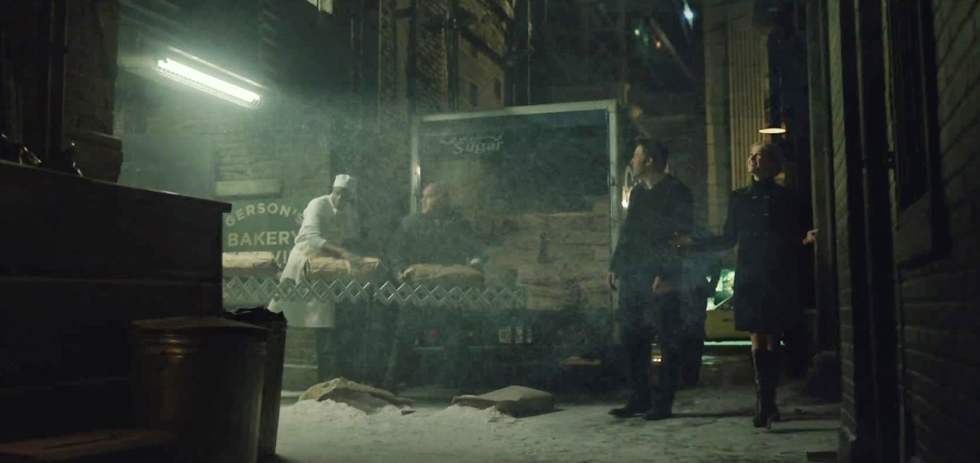
Runner-Up – Mica Levi, Under the Skin
Only one vote separated Mica Levi’s score for Under the Skin, with its now near-iconic track “Lipstick to Void” (aka the music inside ‘the house’), and Trent Reznor and Atticus Ross’ third David Fincher soundtrack, Gone Girl. The edge might have gone to the latter because it manages to exist so well outside of the film, a haunting memory of the film’s pull whilst also a deceptive layered concoction. The track “Sugar Storm” (the scene in which it is used is pictured above) the highlight from the album, an outwardly pleasant piece of musical whimsy only to slowly reveal a damaged and distorted underbelly.
“The score by Trent Reznor and Atticus Ross, usually one of the strong points in Fincher’s more recent work, actually stands stronger outside of the film that within it, it’s a haunting work that ebbs and flows gently, a play on placidity.” – Review by Conor Bateman
Individual Ballots:
| Conor Bateman | Brad Mariano | Jeremy Elphick | Jessica Ellicott |
|
|
|
|
| Felix Hubble | Dominic Barlow | Dominic Ellis | Luke Goodsell |
|
|
|
|
| Virat Nehru | Saro Lusty-Cavallari | Ian Barr | |
|
|
|
